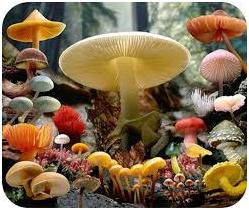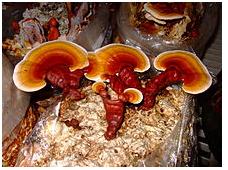A mushroom (or toadstool) is the fleshy, spore-bearing fruiting body of a fungus, typically produced above ground on soil or on its food source.
The standard for the name “mushroom” is the cultivated white button mushroom, Agaricus bisporus; hence the word “mushroom” is most often applied to those fungi (Basidiomycota, Agaricomycetes) that have a stem (stipe), a cap (pileus), and gills (lamellae, sing. lamella) on the underside of the cap. These gills produce microscopic spores that help the fungus spread across the ground or its occupant surface.
Nutrition
Mushrooms are a low-calorie food eaten cooked, raw or as a garnish to a meal. In a 100 g serving, mushrooms are an excellent source (higher than 20% of the daily value, of B vitamins, such as riboflavin, niacin and pantothenic acid, an excellent source of the essential minerals, selenium and copper, and a good source of phosphorus and potassium. Fat, carbohydrate and calorie content are low, with absence of vitamin C and sodium. There are 27 calories in a typical serving of fresh mushrooms.
Edible mushrooms
Mushrooms are used extensively in cooking, in many cuisines (notably Chinese, Korean, European, and Japanese). Though neither meat nor vegetable, mushrooms are known as the “meat” of the vegetable world.
The most popular of these, Agaricus bisporus, is considered safe for most people to eat because it is grown in controlled, sterilized environments. Several varieties of A. bisporus are grown commercially, including whites, crimini, and portobello.
Medicinal properties
Ganoderma lucidum
Some mushrooms or extracts are used or studied as possible treatments for diseases, such as cardiovascular disorders. Some mushroom materials, including polysaccharides, glycoproteins and proteoglycans are under basic research for their potential to modulate immune system responses and inhibit tumor growth, whereas other isolates show potential antiviral, antibacterial, antiparasitic, anti-inflammatory, and antidiabetic properties.
Preliminary experiments show glucan-containing mushroom extracts may affect function of the innate and adaptive immune systems, functioning as bioresponse modulators. In some countries, extracts of polysaccharide-K, schizophyllan, polysaccharide peptide, or lentinan are government-registered adjuvant cancer therapies.
As of June 2014, whole mushrooms or mushroom ingredients are being studied in 32 human clinical trials registered with the US National Institutes of Health for their potential effects on a variety of diseases and normal physiological conditions, including vitamin D deficiency, cancer, bone metabolism, glaucoma, immune functions and inflammatory bowel disease.
Author: Kanchan Sharma











